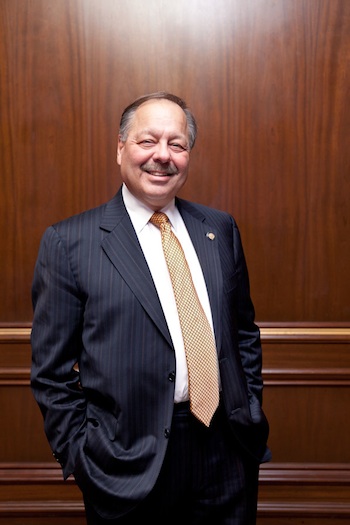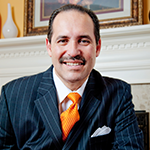Among Chicago attorneys, Hugo Chaviano’s name has become synonymous with integrity. As partner of Sanchez Daniels & Hoffman LLP, he continues to build on his illustrious career and reputation for being hardworking and ethical, but what many associates are unaware of is the precarious road
Chaviano traveled in order to “live the American dream.”
When Chaviano was 13 years old, he left his family in Cuba to set out on his long journey to the United States. It was a risky, emotionally trying decision, but one that was necessary for his future. In Cuba, if you didn’t leave by the age of 15, you had to enlist in the military, which would have left Chaviano confined to the country until at least the age of 27. Further complicating his plan was the very real threat that his parents could be accused of being counter-revolutionaries for sending him out of the country. Consequently, he left Cuba under the pretense that he was going to Spain to attend seminary school and become a priest.
“I left Cuba knowing it was very likely that I would never see my parents again,” Chaviano says. “Four years later, when I was living in New Jersey with my aunt and uncle, I got a phone call out of the blue; it was my parents telling me they’d been granted leave. It was a shock. I was operating under the assumption that I would be raised by my aunt and uncle and would continue to lead a separate life from my family in Cuba.”
Once his parents and two sisters were back in the picture, it was all hands on deck. Chaviano may have come from a family of professionals—complete with a dental practice owning, University of Havana Dental School professor as a father—but, in the United States, it was a very different scenario. Money was scarce and everyone had to contribute to keep the family afloat. Before his parents arrived, Chaviano already had two newspaper routes and by the age of 15, he was working at a dry cleaners sweeping floors and doing maintenance around the shop. When his family arrived from Cuba, they moved to Elizabeth, New Jersey, and he began working at a fast-food joint as a fry cook.
“My memories of that time are brutal,” Chaviano says. “Part of it was the hours. I’d basically have to go straight from school to work, working until midnight. I only had one day off a week and on school days, I’d always fall asleep during first period. The other part was the deep understanding that my life was so different from my peers. I was working and going to school full time while still a teenager and unlike the small handful of my peers who also had jobs, I wasn’t working to buy myself nice shoes or to save up for a car; I was working so that my family could eat and pay their rent. While everyone was getting ready to go out on Saturday night, I was getting ready to go to work. It caused a lot of heartache, that feeling that I couldn’t participate in what so many took for granted.”
To compound the pressure, Chaviano was also the man of the house. His father had to revalidate his credentials in order to practice dentistry in the United States, which required moving away for two years to attend dental school. The overwhelming responsibilities and the experience as an immigrant in America left Chaviano feeling completely displaced. As the attorney says, he came from a “well-to-do” family in Cuba; a family of professionals with means, so his new life in America gave him a brand new vantage point, raising his consciousness and opening his eyes to social issues. Though there was pressure to obtain a medical degree—and after a hellish year of premed that left Chaviano morbidly unhappy—he decided to follow his newfound passion for law after taking a legal history class with an impassioned professor.
The rest, as they say, is history. After graduating with a BA from Rutgers University and a law degree from Northwestern, Chaviano went on to serve as corporate counsel for an esteemed malpractice-insurance-underwriting company and as an attorney at a private firm, which eventually led to the role as cohead of its new house counsel operation. Chaviano has also run his own firm, taught law at Northwestern as an adjunct professor, and served as president of the Hispanic National Bar Association and as secretary general of the Inter American Bar Association.
“What I’ve learned in my career is also an important life lesson: what goes around comes around. You have to be mindful of how you treat the people you come across in life,” Chaviano says. “You might be in a position of power now, but there will come a day when you will be in need and your previous treatment of people will either serve you well or come back to bite you. I’ve been on both sides of the table and I’ve learned you must always be kind, fair, and carry yourself
with dignity.”

